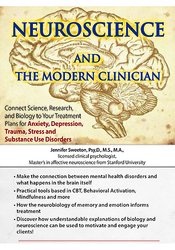
| File type | File name | Number of pages | |
|---|---|---|---|
| Manual - Neuroscience and the Modern Clinician (3.33 MB) | 68 Pages | Available after Purchase |

Sherrie All, PhD, is a licensed clinical neuropsychologist who has specialized in treating people with dementia, Parkinson’s disease, TBI, MS, and other neurological disorders for over a decade. Dr. All is the founder and director of the Chicago Center for Cognitive Wellness, a private neuropsychology practice specializing in cognitive rehabilitation and brain health. The evidence-based cognitive rehabilitation interventions she uses have helped hundreds of adults experiencing cognitive declines improve their thinking skills, expand their functional independence, and enhance their brain health. Dr. All has worked as a consultant to the Mather LifeWays Institute on Aging, helping to develop and evaluate a holistic brain fitness program, and her work with individuals on ways to lower their personal risk for dementia has earned the attention of media outlets including The New Yorker and Crain’s Chicago Business. Dr. All earned her PhD in clinical psychology from Rosalind Franklin University of Medicine and Science, is a member of the American Psychological Association and author of The Neuroscience of Memory: Seven Skills to Optimize Your Brain Power, Improve Memory and Stay Sharp at Any Age.
Speaker Disclosures:
Financial: Sherrie All is the owner of Chicago Center for Cognitive Wellness. She receives royalties as a published author. Sherrie All receives a speaking honorarium and recording royalties from PESI, Inc. She has no relevant financial relationships with ineligible organizations.
Non-Financial: Sherrie All is a member of the American Psychological Association. the Illinois Psychological Association, and the International Neuropsychological Society.
Access never expires for this product.
How Neuroscience Can Enhance Therapy:
What (and Why) Clinicians Need to Know About the Nervous System
| 5 |
|
| 4 |
|
| 3 |
|
| 2 |
|
| 1 |
|
Satisfaction Guarantee
Your satisfaction is our goal and our guarantee. Concerns should be addressed to: PO Box 1000, Eau Claire, WI 54702-1000 or email info@pesi.com.au.
Please wait ...